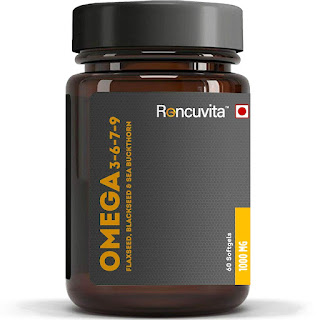Omega 6 is a type of fat found in natural oils, and has been linked to heart disease and plenty of other health issues. In this article, we take a look at what exactly Omega 6 is and how much is being recommended per day for adults with healthy lifestyles. The Omega 6-6 ratio is the amount of Omega 6 to Omega 3. It can be calculated by dividing a person's total intake of Omega 3 by their total intake of Omega 6.
What is Omega 6?
Omega
6 is an essential fatty acid that the human body cannot manufacture on its own,
so it must be obtained through diet. Omega 6 is found in high amounts in most
vegetable oils. Omega 6 is also
known as linoleic acid and can be found in a wide range of food sources
including margarine, nuts, seeds, eggs, and dairy products. Omega 6 is also
found in high amounts in meats, poultry, and fish.
Omega
6 has a variety of benefits to the body that go beyond just maintaining healthy
hair and skin, including the following:
*
Addresses inflammation and helps to prevent it.
*
Plays a role in helping to maintain a healthy nervous system.
*
Helps to maintain a healthy immune system.
*
Plays a role in the development and repair of synapses.
*
Inhibits cancer growth and can also help fight certain types of cancers.
*
Supports the nervous system, liver and eyes.
The Risks of Too
Much Omega-6
The
main types of omega-6 fatty acids are
linoleic and arachidonic acid. These fats are found in the oils that we cook
with and in our diets. Omega-3 is important for heart health and controlling
blood pressure, but too much omega-6 can cause oxidative damage to cells.
Omega-6 fats are found in many foods, including:
Flavor
oils (such as soybean and corn oil) Margarine and butter. In addition to the
risks of excess omega-6, there is some
evidence that omega-3 fatty acids from foods like fatty fish and fish oils are
linked to an increased risk of certain cancers. However, there are no healthy
levels of omega-3 in the typical American diet.
The
most direct effect is to increase inflammation, which can lead to a variety of
diseases, including heart disease and cancer. The researchers estimated that
the world would need to increase food production by 60% to meet the projected
increase in demand for food, so it seems unlikely that most of the world’s
population will increase its consumption of omega-3 fatty acids. Overall, the
report is likely to raise more questions than it answers, but it does call for
more research in this area.
How can I reduce my
intake of omega 6?
Omega
6 is a type of fat found in oily fish, nuts, seeds and vegetable oils like
soybean oil. Omega 6 is also found in dairy products such as milk and cheese.
In the diet, omega 6 helps the body to manufacture more hormones – including
hormones that regulate metabolism, moods, and muscle tone. The problem arises
when we consume too much of the type of fat that contains omega 6.
Unfortunately,
the body doesn’t break down this fat, and this type of fat is stored in our
bodies. The body develops a process called oxidation, which causes the omega 6
to turn into a compound called a free radical. These free radical molecules,
then, damage cells in our body and cause all sorts of health problems.
Foods that contain
omega 6 fatty acids
Omega
6 fatty acids are found in many places, such as vegetables and olive oil, but
they're also present in animal products. Omega 3 fatty acids are
primarily found in fish oil, but can also be found in grass-fed meat, eggs from
pastured hens and nuts. Protein is a building block of life, and it's what we
consume the most of. We need protein from plant sources because animals
(including humans) can't produce their own. Some people need a little more than
others though, and they should get it from sources like quinoa, sprouted
grains, hemp seeds and nuts.
A
small number of people are sensitive or allergic to grains or gluten in
general. Making sure you're eating enough protein at breakfast and dinner is
important for them. The RDA is based on the needs of people over 60. However,
people under the age of 18 needs to consume more protein. It's recommended that
children get 9-13 grams of protein a day, which is about one-third of the RDA
for adults.
Conclusion
Omega
6 is an essential part of a healthy diet. But the question is how much omega 6
do you need? There are different opinions on this. If you're considering a diet
low in omega 6, speak to your doctor beforehand.








